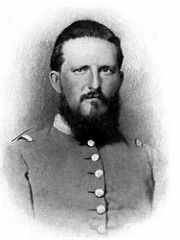Martinsburg, December 9, 1861.
I did not write my accustomed Sunday letter to you on yesterday. I was otherwise busy until 9.30 o’clock last night, when I reached here. Then I was so sleepy and tired, I could hardly stand upon my feet, having been awake all the night before, and hard at work most of it . Yesterday I spent on the bank of the Potomac, not as decent people generally spend the Sabbath, in peace and rest, but listening to the music of cannon and musket, and witnessing their work of destruction. There was much firing, but little damage on either side, as the river intervened, and the men of the enemy, as well as our own, were well sheltered from fire. Our loss, I learn, is one mortally wounded and two very seriously; one of the latter is the son of Shanklin McClure of our county, and a member of the Rockbridge Artillery. The purpose of the expedition was to destroy a dam across the Potomac which feeds the canal now used by the enemy in shipping coal. I was appointed to superintend and direct the execution of the work, with some men detailed to do it. We reached the ground about sunset on Saturday evening, when a few shots from our artillery drove off the force of the enemy stationed on the opposite side. I then took down my force and put it to work and continued until about eleven o’clock, when we were surprised by a fire from the enemy on the opposite side again, which made it impossible to proceed until they could be driven away. At daybreak Sunday morning our cannon opened fire upon them again, but they were so sheltered in the canal–from which in the meantime they had drawn off the water–that it was found impossible to dislodge them. As my workmen could not be protected against the enemy’s fire, I found it necessary to abandon the enterprise. So you see, Love, entrusted with an important work, I have made a failure. If I had succeeded, the Yankees would have suffered much in Washington for want of coal. But they must get it as usual, for which they may thank their riflemen, who drove my party from the work of destruction upon which they were engaged.
I begin to think, Love, there is no amount of fatigue, exposure and starvation which I cannot stand. I got notice on Thursday about three o’clock that I was wanted at Jackson’s headquarters; there I got my directions, and rode here in a hard trot of about six miles to the hour. The next afternoon I rode up and took a view of the work which I had in contemplation and returned here. On Saturday’morning we left here with our forces to accomplish it. On Sunday at twelve o ‘clock I could not help but remark that I felt fresh, although I had not slept the night before, and had nothing to eat since Saturday morning at breakfast, with the exception of a small piece of bread, and had been upon my feet, or my horse, nearly the whole time. I think this war will give me a stock of good health which will last a good while. And now, Love, whilst I have been in the perils of minie-balls, I expect, when I get to Winchester, to receive a letter from somebody saying that you have been in worse perils, and that we have an addition to our small stock of children. The only special message I have is that its name may be yours or mine, just as you like. Whilst, Love, I have just been expressing my gratification at my good health, and my capacity for fatigue and exposure, I cannot help feeling this war is an uncertain life, and there is no telling that you and I may never see much of each other again. I shall try and get a leave of absence to go home this winter; but I suppose it will not be possible until after Christmas, as I think Col. Echols has the promise of a leave at that time, and it would not be proper for us both to be away at the same time.
How much I wish that I was with you, that I could stay at home! But to turn my back upon our cause, to leave the fatigue, patriotism and risk of life which it requires to be borne by others, when duty and patriotism require that I should share it, I cannot do.
